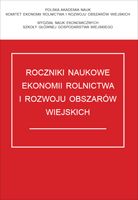Main Article Content
Article Details
Argyle Michael, 2004: Causes and correlates of happiness, [in] Well-being: the foundations of hedonic psychology, D. Kahneman, E. Diener, N. Schwarz (eds.), New York: Russell Sage Foundation, 353-373.
Ahuvia Aaron, 2008:Wealth, Consumption and Happiness, [in] Psychology and Economic Behaviour, A. Lewis (ed.), Cambridge University Press. (Crossref)
Easterlin Richard A. 1974: Does economic growth improve the human lot? [in] Nations and households in economic growth, David P.A., Reder M.W. (eds), Nowy Jork, Academic Press. (Crossref)
Frank Robert H. 2005: Money Buy Happiness?, [in] The science of well-being, Oxford: Oxford University Press, Huppert F.A., Baylis N., Keverne B. (eds.), 461-473. (Crossref)
Glatzer Wolfgang, 1987: Components of wellbeing: German Social Report, Part B, Subjective wellbeing, "Social Indicators Research", 19 (1), p. 171.
Graham Carol, Andrew Felton, 2006: Inequality and happiness: Insights from Latin America, "Journal of Economic Inequality", vol. 4, p. 107-122. (Crossref)
Kalinowski Sławomir, 2015: Poziom życia ludności wiejskiej o niepewnych dochodach, Warszawa, Wydawnictwo Naukowe PWN.
Kaun David E. 2005: Income and happiness: earning and spending as sources of discontent, "The Journal of Socio-Economics", vol. 34, p. 161-177. (Crossref)
Michoń Piotr, 2010: Ekonomia szczęścia, Poznań, Dom Wydawniczy Harasimowicz.
Nettle Daniel, 2005: Happiness, the science behind your smile, Oxford, Oxford University Press. (Crossref)
Rayo Luis, Gary S. Becker, 2007: Evolutionary efficiency and happiness, "Journal of Political Economy", vol. 115, p. 302-337. (Crossref)
Strube Michael J., Cynthia L. Lott, G.M. Le-Xuan-Hy, Julie Oxenberg, Ann K. Deichmann, 1986: Self-evaluation of abilities: Accurate self-assessment versus biased self-enhancement, "Journal of Personality and Social Psychology", vol. 51, p. 16-25. (Crossref)
Zaleśkiewicz Tomasz, 2013: Psychologia pieniądza, [in] Psychologia Ekonomiczna, T. Tyszka (red.), Gdańsk, Gdańskie Wyd. Psychologiczne, p. 56.
Zapf Wolfgang, 1984: The four well-beingpositions, [in] Lebensqualitat in der Bundesrepublik Deutschland, W. Glatzer, W. Zapf (eds.), Frankfurt, Campus.
Downloads
- Piotr Sulewski, FARMERS’ RISK AVERSION AND THEIR ATTITUDES TOWARDS CHANGES IN FARMS , Annals of Agricultural Economics and Rural Development: Vol. 102 No. 4 (2015)
- Piotr Sulewski, Anna Kłoczko-Gajewska, Determinants of Taking out Insurance Against Losses in Agricultural Production in Poland , Annals of Agricultural Economics and Rural Development: Vol. 101 No. 4 (2014)
- Piotr Sulewski, Farmer’s Risk Aversion Impact On Farm’s Results , Annals of Agricultural Economics and Rural Development: Vol. 98 No. 2 (2011)
You may also start an advanced similarity search for this article.
- Wojciech Ziętara, ORGANISATION AND THE ECONOMICS OF MILK PRODUCTION IN POLAND, TRENDS IN THE PAST AND FUTURE , Annals of Agricultural Economics and Rural Development: Vol. 99 No. 1 (2012)
- Wojciech Ziętara, Measures of the size of agricultural farms and agricultural enterprises , Annals of Agricultural Economics and Rural Development: Vol. 96 No. 4 (2009)
- Wojciech Ziętara, SOCIAL OR ECONOMIC NATURE OF THE AGRICULTURAL REFORMS IN POLAND DURING THE INTER- AND POST-WAR , Annals of Agricultural Economics and Rural Development: Vol. 102 No. 1 (2015)
- Wojciech Ziętara, Internal conditions of development of Polish agriculture , Annals of Agricultural Economics and Rural Development: Vol. 94 No. 2 (2008)
- Wojciech Józwiak, Zofia Mirkowska, Wojciech Ziętara, The role of large agricultural farms in the growth of the productivity of Polish agriculture in the background of the situation in other selected countries of the European Union , Annals of Agricultural Economics and Rural Development: Vol. 105 No. 1 (2018)
- Wojciech Ziętara, Marcin Adamski, Zofia Mirkowska, ACTUAL VS. OPTIMAL PERIOD OF THE UTILITY OF DAIRY COWS , Annals of Agricultural Economics and Rural Development: Vol. 100 No. 3 (2013)
- Wojciech Ziętara, Profesor Janusz Kosicki. The life and the work (jubilee of the birthday 80th) , Annals of Agricultural Economics and Rural Development: Vol. 95 No. 1 (2008)
- Wojciech Ziętara, Tendencies in changes of milk production in Poland , Annals of Agricultural Economics and Rural Development: Vol. 96 No. 1 (2009)
- Adam Kagan, Wojciech Ziętara, Economic efficiency of farming depending on the land ownership type , Annals of Agricultural Economics and Rural Development: Vol. 105 No. 2 (2018)
- Wojciech Ziętara, Economic and organization problems dairy production with high milk yield , Annals of Agricultural Economics and Rural Development: Vol. 93 No. 2 (2007)




